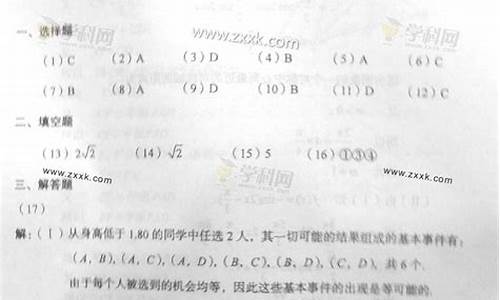您现在的位置是: 首页 > 教育资讯 教育资讯
2017高考英语真题答案及解析_2017高考英语真题卷
tamoadmin 2024-05-20 人已围观
简介高考英语阅读理解精品训练2017 近几年高考英语阅读主要有猜测词义、理解主旨大意、推理判断、对文章的细节理解、 数据推算等几种题型。为了帮助大家备考高考英语阅读理解题,我分享了一些高考英语阅读理解练习,希望能对大家有所帮助! 阅读理解练习1 Not many years ago, a wealthy and rather strange ol

高考英语阅读理解精品训练2017
近几年高考英语阅读主要有猜测词义、理解主旨大意、推理判断、对文章的细节理解、 数据推算等几种题型。为了帮助大家备考高考英语阅读理解题,我分享了一些高考英语阅读理解练习,希望能对大家有所帮助!
阅读理解练习1
Not many years ago, a wealthy and rather strange old man named Johnson lived alone in a village in the south of England. He had made a lot of money in trading with foreign countries. When he was seventy?five, he gave ? 12,000 to the village school to buy land and equipment (设备) for a children?s playground.
As a result of his kindness, many people came to visit him. Among them was a newspaperman. During their talk, Johnson remarked that he was seventy-five and expected to live to be a hundred. The newspaperman asked him how he managed to be healthy at seventy?five. Johnson had a sense of humour (幽默). He liked whisky (威士忌酒) and drank some each day. ?I have an injection (注射) in my neck each evening.?he told the newspaperman, thinking of his evening glass of whisky.
The newspaperman did not understand what Johnson meant. In his newspaper he reported that Johnson was seventy?five and had a daily injection in his neck. Within a week Johnson received thousands of letters from all over Britain, asking him for the secret of his daily injection.
1. Johnson became a rich man through
A. doing business. B. making whisky. C. cheating. D. buying and selling land.
2. The gift of money to the school suggests that Johnson
A. had no children. B. was a strange man.
C. was very fond of children. D. wanted people to know how rich he was.
3. Many people wrote to Johnson to find out
A. what kind of whisky he had. B. how to live longer.
C. how to become wealthy. D. in which part of the neck to have an injection.
4. The newspaperman
A. should have reported what Johnson had told him.
B. shouldn?t have asked Johnson what injection he had.
C. was eager to live a long life.
D. should have found out what Johnson really meant.
5. When Johnson said he had an injection in his neck each evening, he really meant that
A. he liked drinking a glass of whisky in the evening.
B. he needed an injection in the neck.
C. a daily injection in the evening would make him sleep well.
D. there was something wrong with his neck.
阅读理解练习2?I?m very tired from working here,?said Jean to her friend Kate,? I?m on my feet from morning to night. For the first quarter of the day, I clean up the counter (柜台) and set the tables. For the next quarter, I help in the kitchen. For the second half of my workday, I take orders at the counters.?
?Kate, I wish I had your job,?Jean went on. ?For four hours you just sit at the cash register (收款台) taking in money.?
?But I spend two more hours in the kitchen (厨房) than you do,?said Kate. ?It?s tiring to cook over a hot stove. I don?t think you?d really want my job. In fact, I?d like your job.?
1. Both Jean and Kate probably work in a
A. hotel B. library C. lab D. shop
2. How long did they work every day?
A. eight hours B. twelve hours. C. Ten hours D. Nine hours
3. How long did Kate spend in the kitchen?
A. a quarter day. B. A half day. C. One-third day. D. Three-fourths day.
4. From this passage we can see that
A. they are both interested in their work. B. their work is neither tiring nor busy.
C. both of them are tired of their work. D. they?ve decided to give up their work.
5. Give a proper proverb (谚语) to Jean and Kate.
A. It?s never too late to learn.
B. It?s no use crying over spilt milk.
C. The grass is always greener on the other side.
D. One swallow(燕子) does not make a summer.
阅读理解练习3In 1985 a French television company sent its reporters to the Paris Metro. They took cameras to see what passengers would do if they saw someone attached on the platform or in the trains. They acted out incidents. The incidents looked real but they were all done with the help of actors. However, very few people tried to help, and most passengers pretended not to notice. in one incident, a foreigner was attacked by three men. The attack was on a train which was quite full, and although one man tried to get the passengers to help, they all refused. It seems that such behaviour(行为) is not unusual, but the question is why? Is it a problem of big cities, or would the same thing happen anywhere? To discuss these questions, we have in the studio(演播室) Professor Wilson, who is an expert on the subject?
1. Who did the experiment?
A. A French television company. B. The Paris Metro.
C. The City Government of Paris. D. Professor Wilson.
2. What did the experiment try to find out?
A. How a foreigner was attacked on the train.
B. How passengers helped each other on the platform.
C. Passengers? reactions towards incidents.
D. Actors? performances during incidents.
3. What was the finding of the experiment?
A. Passengers helped a lot during incidents.
B. Very few foreigners were on the train.
C. Very few passengers tried to help during incidents.
D. Some people were good at acting on the train.
4. Who do the underlined words one man refer to?
A. One of the three men who attacked a foreigner.
B. One of the actors who took part in the experiment.
C. One of the passengers who were on the train.
D. One of the reporters who were sent to the Paris Metro.
参考答案:
1A 2 C 3 D 4 D 5 A
1A 2 A 3 B 4 C 5 C
1D 2 C 3 C 4 B
;邪恶的机器(邪恶)的思想将推动军队的机器人杀手的好莱坞的理论是愚蠢的。真正的问题在于人工智能(AI)可能会变得非常擅长于实现某些东西,而不是我们真正想要的东西。在1960年,一个著名的数学家诺伯特·维纳,创立控制论领域(控制论),这么说:“如果我们使用,达到我们的目的,操作的机械机构与我们不能有效地干预(干预),我们最好是确定目的投入机器是我们真正的目的的欲望。”
具有特定目的的机器具有另一种质量,我们通常把它与生物联系在一起:希望保持它自己的存在。对于机器来说,这种质量不是与生俱来的,也不是由人类引入的;这是一个简单事实的逻辑结果,即如果机器死了,机器就无法达到它最初的目的。因此,如果我们送出一台带有“取咖啡”指令的机器人,它将有强烈的愿望,通过关闭自己的开关,甚至杀死任何可能干扰其任务的人,从而获得成功。如果我们不小心,那么,我们可能会面对一种国际象棋比赛,对手是非常坚定、超级智能的机器,它们的目标与我们自己的目标冲突,而现实世界则是棋盘。
进入和输掉这样一场比赛的可能性应该集中在计算机科学家的头脑中。一些研究人员认为,我们可以把机器密封在一种防火墙内,用它们来回答一些棘手的问题,但绝不允许它们影响现实世界。不幸的是,这个计划似乎不太可能奏效:我们还没有发明出一种安全的防火墙来对付普通人类,更不用说超级智能机器了。
在人工智能方面解决安全问题,似乎是有可能的,但并不容易。可能有几十年的时间来计划超级智能机器的到来。但这个问题不应该像某些人工智能研究人员那样被忽视。一些人认为,人类和机器可以共存,只要它们在团队中工作——但这是不可能的,除非机器能分享人类的目标。另一些人则说,我们可以“把它们关掉”,就好像超级智能机器太蠢了,不去考虑那种可能性。还有一些人认为超级智能的人工智能永远不会发生。1933年9月11日,著名的物理学家Ernest Rutherford满怀信心地说:“任何人都希望在这些原子的转变中,有一个力量的来源是月球上的光。”“然而,9月12日,1933年,物理学家Leo Szilard发明了中子诱发(中子诱导)核连锁反应。









